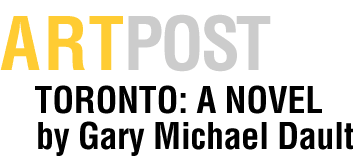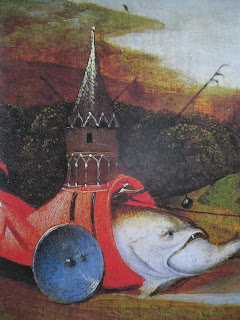Violet Dollop had never been the sort of
woman who had made much use of housekeeping hints or cooking tips by
professionals, whether Martha Stewart’s or the ones in the Food & Drink magazines published by the LCBO. Now, suddenly, she was assiduously
buying Martha Stewart cookbooks and respectfully downloading Martha’s emails,
as well as collecting and filing Food and Drink issues every time she saw them in the store.
Lately, there wasn’t
a time when, as Tom left to get some beer or a bottle of wine, Violet wouldn’t
sing out from the kitchen, “Don’t forget to see if they have a new Food
& Drink!” He always did forget. Which annoyed her considerably because
they only printed so many copies and they went fast and when they were gone
they were gone.
“I think it’s just a
quarterly,” she said to Tom.
“What is?”
“Food and Drink.”
Tom had no idea what
she was talking about.
“The food magazine I
ask you to pick up at the LCBO.”
“Ah,” said Tom.
“So that’s why you
have to pick one up as soon as they come in.”
“Sure,” said Tom. “I
can see that.”
Violet knew perfectly
well Tom hadn’t followed any of what she’d said.
“You can see what?” she asked him.
“About the LCBO,” Tom
replied.
Violet went back to
her sewing room.
Mayor Cass
Tamburlaine was pacing his vast, softly carpeted floor of his office. His Isolation tank sat heavily in the
middle of the room like a hippopotamus in a tropical river. He gazed at it for a moment or two and
then called Joy Pommery, his sometime mistress. Her phone rang softly—three times. On the fourth ring she picked up.
“Why Cass, how nice
to hear from you. And it’s not
even three in the morning!”
“Yeh. What are you doing?”
“Well, actually, dear,
I’m with a client.” Joy was a
psychotherapist with an electronics company located, for the time being, out
near the airport.
“When will you be
through?”
“In a couple of
hours. Why?”
“I’ve been getting more death threats in the mail.”
“I’ve been getting more death threats in the mail.”
“More of those pretty
ones—the Old Master paintings?”
“I don’t find them so
goddam pretty.”
“I suppose not.”
“Listen, remember your friend, the fashion-model-detective?”
“Listen, remember your friend, the fashion-model-detective?”
“Coal Blackstone.”
“Yeh. Can you get hold of her again for me?
“Don’t you have her number?”
“Don’t you have her number?”
“I dunno, I must have
thrown it out. I’d really like to
talk to her.”
Joy tells him the
number again.
“Write it down
somewhere where you won’t lose it.”
“I have.”
“Were did you write it?”
There was a breathy
pause.
“Cass?”
“On my thigh,” he
told her. “I wrote it on my thigh.”
“Oh Cass, “laughed
Joy, “are you naked in the office again?
Michael finally bid
farewell to Bliss Carmen and her painter and short-order-cook boyfriend, Homer
Rubik, and making way back out onto the fire escape outside of Homer’s
unwholesome, maliferous studio, gratefully took a big lungful of clean
air. Bliss had followed him
outside.
“So whatdyathink,
Zorba? Isn’t he great?”
“Well, he certainly
can draw and paint. He’s skilful.”
“Fuckin’ right!” boomed Bliss. “But is he a great artist?”
“Well, not yet of course. Why,” Michael asked her, “are you in a hurry?”
“Yeh, a big hurry!”
“How come?”
“I’m not getting any
younger,” Bliss told him. “Homer
neither.”
Michael was
puzzled.
“What do you
have…some cutoff date by which Homer should be famous?”
Famous and,” Bliss added—rather coyly, Michael
thought—“wealthy.”
“I see.”
“You think he has the
stuff?” Bliss persisted.
“I don’t know.”
“Well he better,” Bliss muttered darkly.
May sat in the
bookstore, hoping that, on such a wet, sleety afternoon, nobody would come
in. She had the store all to
herself this afternoon. She was
sitting at the desk, her copy of John Cowper Powys’s Wolf Solent open in front of her. She was sipping from a glass of hot
green tea. It was cool in the
store and the steam was rising from the glass.
“A species of deep, lethargic
numbness to everything except the immediate suggestion of his voice and touch
seemed to have taken possession of her”, she read. “His arm round her. Her cream-coloured cloak hanging loose,
her cheeks pale, she let herself be led across the intervening tract of grass
to the open door of the little shed….”
“A little shed,” she
mused aloud. “A sweet little shed
where I could go with Michael.
Across an intervening tract of grass. A cream-coloured cloak….”
Just then the bell
over the door jangled and a tall, elderly man entered the store. He smiled at her. She attempted to smile back pleasantly.
“Do you by any chance
have books by Alice Munro?” he asked her.
“Many” she said,
getting up to lead him to the Canadian fiction section.
After a little while,
he came to the desk with three or four volumes of Munro’s short stories.
“And what are you reading?” he asked her pleasantly.
“Michael” she said
absently.
Coal Blackstone lay
happily exhausted in the arms of her favourite photographer and part-time
lover, Lincoln Ford. She looked
very white, Linc thought, against the black sheets. White, almost to the point of iridescence. Abalone shell.
“Beautiful,” Linc
whispered in her ear, repositioning a damp wisp of her jet-black hair that had
ended up glued to her cheek.
“You’re exquisite.”
“Oh I bet you say
that to all the
high-fashion models you’ve just had meaningful congress with,” Coal laughed,
toying ineffectually with the rivulet of curly black hair that meandered down
Linc’s stomach.
“Sure, all the
time,” Linc smirked,
“but…well, I don’t often use the word ‘irridescent’.”
“What do you mean? You
didn’t use it with me
either.”
“I didn’t?”
“No.”
“That’s funny. I was thinking it. I was also thinking ‘Abalone shell’.”
“You were? That’s nice. You didn’t say that either.”
“I guess I figured
they were sort of fancy-dancy ways of describing you, and that they might sound
a bit silly. I wouldn’t want you
laughing at me!”
“Not in bed anyhow,”
smiled Coal.
“That’s right,” he
said, deftly clasping her left knee.
“You planning on
moving your hand up or down?” she asked him winsomely.
“I hadn’t decided
yet,” Linc told her. “Geez, how much
planning do you think I actually put into our times together? Being in bed with you isn’t like taking your photograph, you
know.”
“No?” Coal giggled. “I thought it was all love love love, no
matter what you were
doing!”
Linc scowled.
“You keep talking
like that and I’m going to take back my Abalone shell,” he said.


